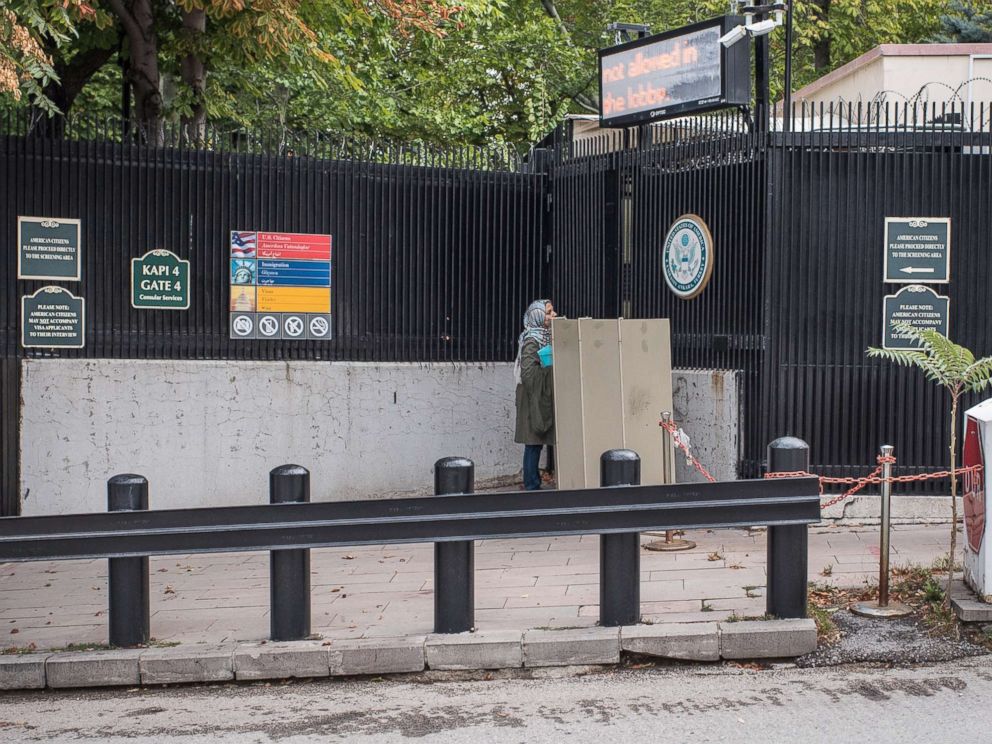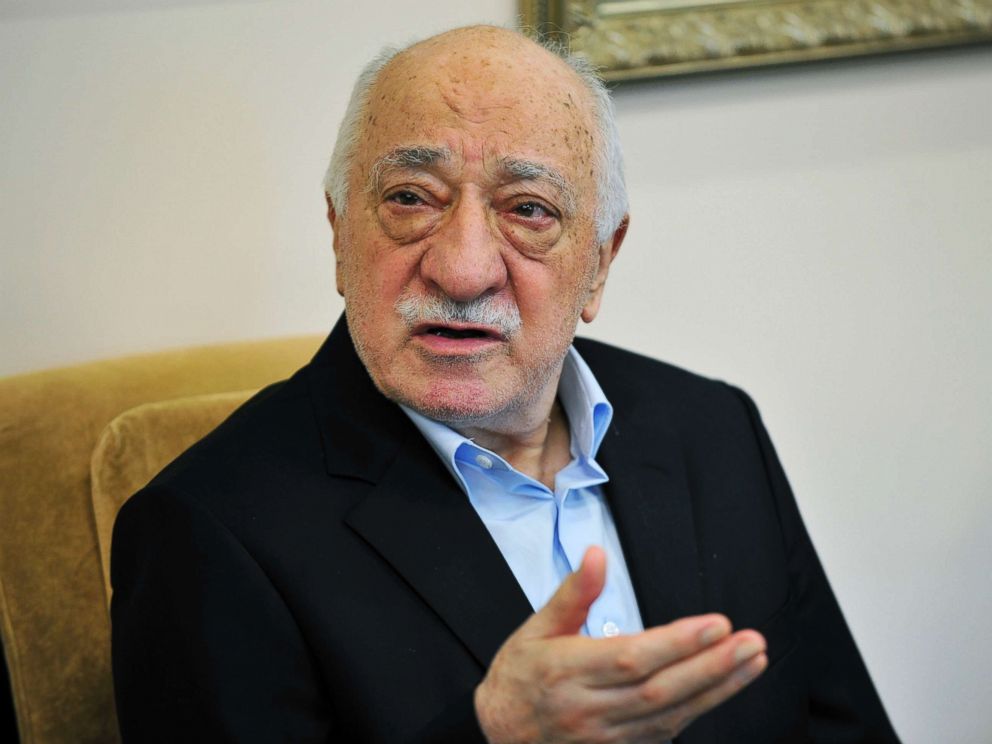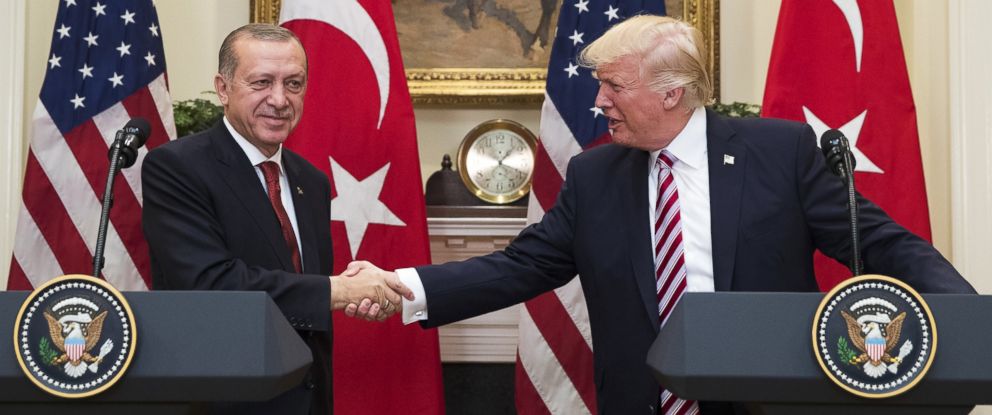US, Turkey resume visa services amid low point in relations
The U.S. and Turkey have resumed full visa services for the other country after a months-long dispute that demonstrated just how low relations have fallen between the NATO allies.
Interested in Turkey?
Add Turkey as an interest to stay up to date on the latest Turkey news, video, and analysis from ABC News. Turkey Add Interest
The resumptions, effective immediately, come despite ongoing disputes over U.S. support for Kurdish groups in Iraq and Syria, Turkey's closer ties to Russia and Iran, and an ongoing fight over a Turkish cleric who has asylum in the U.S. and whom Turkey accuses of orchestrating a coup against President Recep Tayyip Erdogan.
Even in Thursday's dual announcements of some rapprochement, there was debate.
The U.S. said in its announcement of a "full resumption" of visa services at its missions in Turkey that the government of Turkey had given and adhered to "high-level assurances" that no local employees are under investigation and would not be detained or arrested for doing their official duties or without prior notice to the U.S. government.
But Turkey, in its own statement, denied that such pledges were ever made.
"Turkey is a state of law, and … that our government has not provided any assurances concerning the ongoing judicial processes," the Turkish embassy in Washington said. "It is inappropriate to misinform Turkish and American public that such assurances were provided."
Visa services were first suspended entirely by the U.S. on Oct. 8 after a second Turkish national who works for the U.S. mission in Turkey was detained by authorities. The unnamed local employee was arrested for purported ties to that cleric, Fethullah Gulen, and his political movement, which Turkey considers a terrorist group — after Hamza Ulucay, an employee at the U.S. consulate in Adana, was arrested in March for alleged ties to the PKK, a Kurdish militant group designated a terrorist organization by Turkey and the U.S.
Neither man was initially granted access to legal counsel, and the U.S. was provided little information on the charges against them or the evidence, according to the State Department.
Turkey retaliated hours later, mimicking the State Department press release by cribbing its language nearly verbatim.
 Diego Cupolo/NurPhoto via Getty Images, FILE
Diego Cupolo/NurPhoto via Getty Images, FILEAfter weeks of sustained discussions, the U.S. resumed limited visa services on November 6, with Turkey again almost immediately saying it would do the same — although it denied there had been any assurances given, just as it did Thursday.
The U.S. still has "serious concerns" about the two employees' cases, the State Department said, but will work with Turkey "to seek a satisfactory resolution."
Relations between the U.S. and its key NATO ally Turkey, where the U.S. has an airbase vital to the fight against ISIS and stockpiled with 50 nuclear bombs, have been souring for a couple of years now.
Turkey has expressed outrage over U.S. support for Kurdish groups battling ISIS in Iraq and Syria. The U.S. has been arming, training, and supporting the Syrian Democratic Forces in Turkey's southern neighbor Syria, and the strongest element of that group is the YPG, a Kurdish group with ties to Kurds in Turkey, including the PKK. The U.S. makes a distinction between the YPG and the PKK, but Turkey does not.
With U.S. support, the Syrian Democratic Forces and YPG drove ISIS out of its strongholds in northern Syria, including its self-declared capital Raqqa, from which the terror group had plotted attacks on the West. But after a call between President Trump and Erdogan on Nov. 24, the White House announced that the U.S. would make "adjustments to the military support provided to our partners on the ground in Syria."
"Mr. Trump clearly stated that he had given clear instructions and that the YPG won't be given arms, and that this nonsense should have ended a long time ago," Turkish Foreign Minister Mevlüt Çavusoglu, who sat in on the call, said in a press conference afterwards.
The Pentagon has yet to announce any changes.
But even more damage has been done to U.S.-Turkish relations by the arrest and prosecution of each other's citizens.
Most visibly, Turkey has demanded the extradition of Gulen, the cleric Turkey holds responsible for the attempted coup in July 2016. Because Gulen is a legal permanent resident of the U.S., first the Obama administration and now Trump's administration have so far refused Turkey's request, saying the U.S. must receive more conclusive evidence of his involvement first. Gulen has denied any role in the failed coup.
 Chris Post/AP, FILE
Chris Post/AP, FILEIn his November visit to Washington, Turkish Prime Minister Binali Yildirim compared the coup to the Sept. 11 attacks and said Turkish people demand Gulen's return — with the implication that the U.S. is sheltering this alleged mastermind from justice.
Perhaps even more than Gulen, however, Turkey has been incensed by the charges filed in U.S. federal court against a former Turkish economy minister and other Turkish officials. U.S. prosecutors alleged the Turkish officials conspired to violate U.S. sanctions on Iran in a billion-dollar scheme, with the help of a Turkish-Iranian gold trader named Reza Zarrab.
Zarrab pleaded guilty to his role in the conspiracy, laundering Iranian oil and gas revenues through U.S. banks, and has become a key witness for the prosecution as it continues the case against Mehmet Hakan Atilla, an executive at the state-owned bank Halkbank which was allegedly involved in the scheme.
Zarrab has testified that he paid bribes to then-foreign minister Zafer Çaglayan and that Erdogan himself ordered that two Turkish banks participate in the conspiracy.
Erdogan has blasted the trial as a "plot" to overthrow his government, after intensely lobbying top U.S. officials in the Obama and Trump administrations to drop the charges against Zarrab and Atilla.
But Ahmet Davutoglu, the country's prime minister at the time, said in early December the country did not comply with U.S. sanctions, saying, "We have never been hypocritical when it comes to the embargo against Iran. We have never complied with the U.S.'s one-sided embargo. We can not," according to multiple press reports.
"Turkey still has very serious concerns about the ongoing cases against Turkish citizens in the United States. Turkish officials will continue to engage with their American counterparts to seek a satisfactory resolution of these cases," the Turkish embassy said in its announcement today.
The State Department has dismissed the allegation of a U.S.-backed coup as "ridiculous" — and in turn, criticized Turkey for its detention of American citizens as well. As many as a dozen Americans, many of whom are dual citizens of Turkey, have been detained in Erdogan's sweeping purge of political opponents since the coup.
In particular, the Trump administration has continually raised the case of American pastor Andrew Brunson, who was detained in October 2016 and charged for purported involvement with the Gulen movement — something his family has denied.
The White House has said Trump has raised the issue with Erdogan directly. But instead of offering his release, Erdogan has publicly floated the idea of a swap — Brunson for Gulen — an act usually necessary only between enemy states. "You have one pastor as well," he said in September in reference to Gulen. "Give him to us. Then we will try [Brunson] and give him to you."
The U.S. has rejected that idea, with State Department spokesperson Heather Nauert saying in September, "We continue to advocate for his release. He was wrongfully imprisoned in Turkey… I can’t imagine that we would go down that road" of a prisoner swap.
The State Department said again today it is "concerned" about these cases against U.S. citizens and will work with Turkey towards a "satisfactory resolution."
- Star
Add Interests Customize your news feed by choosing the topics that interest you.
To save your interests across all devices Log In or Sign Up »Source – abcnews.go.com

